 “They’re so wrong.” “They’re impossible.” “They’re never going to change their minds.”
“They’re so wrong.” “They’re impossible.” “They’re never going to change their minds.”
That’s a lot of they-ing and overstatement. And yet, I think that’s what we do – we write others off as beyond hope. All too frequently, I think we dismiss people who think differently than we do – patently, wholesale, and out of hand. We de-friend people on social media and reduce or avoid contact with co-workers, friends from our past, people at the gym, and even members of our own families. We cancel them.
I get it. Indeed, I not only get it, I’ve done it, and.. sigh.. sometimes still do it. We liberals and progressives really give a darn about certain things and it’s not comfortable to be around people who disagree with us about the real and present danger of human aggravated global warming. It rubs us the wrong way to be in the presence of people who justify or engage in racism, homophobia, transphobia, xenophobia (fear of “foreigners”), misogyny/patriarchy (oppressing women), capital punishment, and refusing reproductive rights for women or health care for all citizens. It causes our blood pressures to rise to be around people who condone financial exploitation and oppression, continued mass shootings (anti-sensible gun control), continued high rates of incarceration (anti-legalizing recreational drugs), disproportionate violence by police against black citizens, and polluting the environment.
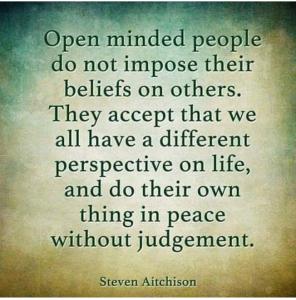 It’s of course perfectly understandable for persons who are oppressed to feel wary of engaging with people who are actively oppressing them – their need to feel safe is paramount. Yet there are a lot of us who aren’t really in harms way – who really can be in the presence of those who disagree with us … we just don’t want to. Taking guidance and perceived blessing from memes saying, “Don’t try to win over the haters. You’re not the jackass whisperer” (quote by Scott Stratten), etc., we unfriend friends and family members on social media because we’d rather not see them voicing their views (forgetting that it’s possible to unfollow or mute people without unfriending them – we can control what shows up in our news-feeds) – but instead of engaging in such nuance, we frequently take the nuclear option – de-friending, blocking, and banning them. They become “dead to us.” Cancelled.
It’s of course perfectly understandable for persons who are oppressed to feel wary of engaging with people who are actively oppressing them – their need to feel safe is paramount. Yet there are a lot of us who aren’t really in harms way – who really can be in the presence of those who disagree with us … we just don’t want to. Taking guidance and perceived blessing from memes saying, “Don’t try to win over the haters. You’re not the jackass whisperer” (quote by Scott Stratten), etc., we unfriend friends and family members on social media because we’d rather not see them voicing their views (forgetting that it’s possible to unfollow or mute people without unfriending them – we can control what shows up in our news-feeds) – but instead of engaging in such nuance, we frequently take the nuclear option – de-friending, blocking, and banning them. They become “dead to us.” Cancelled.
Let me ask, How’s that working for us?
Sure, I think we can say that it may be helping us to feel less stress and to sleep better at night. Maybe. We can maybe say that “our lives are less stressful and that we breathe easier” through our efforts to avoid and shun certain others. I’ve certainly felt that from time to time… at least for a few days here and there. But that increase in personal comfort – ain’t helping the world – a world that literally needs to breathe easier with less pollution. Generations of children in the future are being harmed by our prioritizing our personal comfort over their right to live reasonably well, or even exist. What the world needs is for adults to engage with one another as grown-ups. The question, “how’s that working for us?” – was rhetorical. I think it’s not working well for us. If we are to adequately address the grave, real, and present danger of global warming/climate change, it will require all hands on deck, and not all hands will be on deck if we fail to stay in relationship and connection with those who currently don’t share our views. Moreover, I think if we’re being honest, we still struggle sleeping well at night – in part because of that estrangement from those we love.
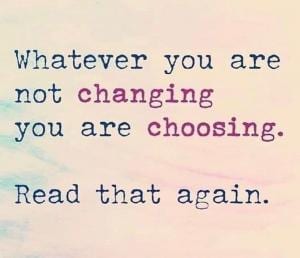 Instead of staying connected with one another in this challenging society, we resign ourselves to further estrangement and polarization. We opt to be resigned to maintaining our divided culture- perpetuating a cold civil war that we tacitly and even overtly maintain and condone. As teacher Laurie Buchanan puts it, “whatever you are not changing, you are choosing.”
Instead of staying connected with one another in this challenging society, we resign ourselves to further estrangement and polarization. We opt to be resigned to maintaining our divided culture- perpetuating a cold civil war that we tacitly and even overtly maintain and condone. As teacher Laurie Buchanan puts it, “whatever you are not changing, you are choosing.”
I think we liberals are quick to see how “those people” (for instance, MAGA hat-wearing Trump supporters, etc) are examples of the Dunning-Kruger effect – a type of cognitive bias in which people believe that they are smarter and more capable than they really are – they think they know far more than they actually do. “Those people think the earth is flat, that the earth is only 5000 years old… they’re dopes who don’t know science!” And, similarly, we readily see how conservatives exemplify the Backfire Effect – the phenomenon whereby people when presented with facts that contradict their current beliefs – instead of shifting their opinions in light of those new facts, instead double down on their current beliefs. Numerous studies over the past decade indicate reality and extent of this phenomenon.
And, so we tell ourselves that “those people are idiots and there’s no use to even try to change their minds. Hell, we may as well not even converse with them at all!” Cancelled.
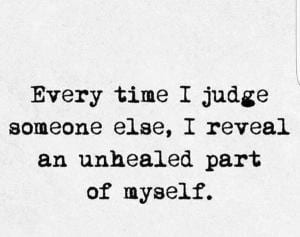 Yeah, I feel that. That’s pretty compelling and it certainly makes sense why we might feel that way and want to respond in those ways. Yet I wonder if there might be more for us to look at. I sometimes wonder if I might not have a blind spot or two. I wonder if maybe I’m sometimes prone to the Dunning-Kruger Effect, and if there might not be some times when I demonstrate the Backfire Effect. If I’m being honest … sigh… I admit I do, I am, and I do. Mea culpa.
Yeah, I feel that. That’s pretty compelling and it certainly makes sense why we might feel that way and want to respond in those ways. Yet I wonder if there might be more for us to look at. I sometimes wonder if I might not have a blind spot or two. I wonder if maybe I’m sometimes prone to the Dunning-Kruger Effect, and if there might not be some times when I demonstrate the Backfire Effect. If I’m being honest … sigh… I admit I do, I am, and I do. Mea culpa.
In fact, I wonder if a lot of us liberals might in fact be just as guilty of this as we think “they” are – or at least are guilty of it from time to time. I’m not now thinking here of the many liberal parents who avoid having their children receive vaccinations against diseases for fear that vaccinations “cause autism” or fill us with poisons that they think “do more harm than good.” Nor am I thinking of the extreme liberals who think that the cone-trails of water vapor that jet airplanes emit are “chem-trails” that the government is poisoning us with. Although, those are pretty good examples – and I do believe some conspiracy theories are valid, including warranted concern about what really happened on 9/11, and the lead up to the war in Iraq. Instead, my focus today is the growing body of psychological studies that show us the things that are effective in helping change the minds of people who differ from us.
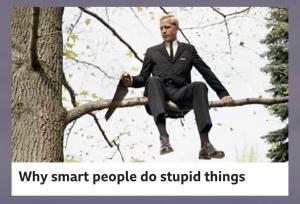 Specifically, though there are in fact proven ways to effectively help people shift from their current beliefs and to come around to our way (or at least new ways) of thinking, we instead lazily, and I think immorally, write them off as “beyond hope.” Instead of attempting some of the techniques that experts say really can help people to shift – we don’t even bother trying. Bottom line – it could ironically be that we’re bigoted against people who don’t think as we do. Even though there are things we can do to help change people’s minds, we tell ourselves “life’s too short to do the hard work of relating to or interacting such people.” So, we double-down on our current views (the Backfire Effect) and deny that it’s possible for people to change and that there’s anything we can do to help them to shift. Thus, it could be the case we’re complicit in preventing getting all hands on deck (or as many as possible) to effectively deal with global warming… and everything else we care about.
Specifically, though there are in fact proven ways to effectively help people shift from their current beliefs and to come around to our way (or at least new ways) of thinking, we instead lazily, and I think immorally, write them off as “beyond hope.” Instead of attempting some of the techniques that experts say really can help people to shift – we don’t even bother trying. Bottom line – it could ironically be that we’re bigoted against people who don’t think as we do. Even though there are things we can do to help change people’s minds, we tell ourselves “life’s too short to do the hard work of relating to or interacting such people.” So, we double-down on our current views (the Backfire Effect) and deny that it’s possible for people to change and that there’s anything we can do to help them to shift. Thus, it could be the case we’re complicit in preventing getting all hands on deck (or as many as possible) to effectively deal with global warming… and everything else we care about.
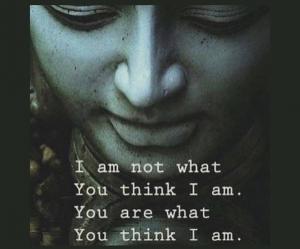 Ah.. Oooh. Feeling that. It may be the case that “our inner Nathan’s just told our inner Davids – Thou art the man/person.” [The ancient Hebrew prophet Nathan helped King David realize and admit that he was guilty of something vile that he was outraged about someone else supposedly doing].
Ah.. Oooh. Feeling that. It may be the case that “our inner Nathan’s just told our inner Davids – Thou art the man/person.” [The ancient Hebrew prophet Nathan helped King David realize and admit that he was guilty of something vile that he was outraged about someone else supposedly doing].
Let’s take a moment ..breathe into this. Yeah, I’m feeling a bit seen right now. A bit squirmy in my seat. A bit exposed. And perhaps, a bit “convicted” to see the merit of pondering these things… maybe even feeling some openness to trying out some of these new tools when I interact with others.
Along with the suggestions provided in the hyperlinks in the paragraphs above, here are some things that I’m trying lately that seem to be helping:
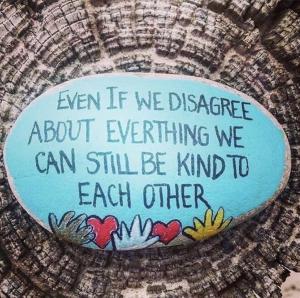 * Dropping my usual defensive or attacking postures – often sarcastic, terse, and curt – and instead assuming a far more civil, humble, and curious demeanor. (I’m more likely to do this if I’ve been engaging in my daily-ish centering prayer practice.)
* Dropping my usual defensive or attacking postures – often sarcastic, terse, and curt – and instead assuming a far more civil, humble, and curious demeanor. (I’m more likely to do this if I’ve been engaging in my daily-ish centering prayer practice.)
* Saying, “Huh. We seem to have different views on this. Would you be willing to tell me about some of the experiences you’ve had in life that lead you to think the way you do about this?” This conveys 1) that I’m curious about them and what they have to say, 2) that I’m not engaging in a debate, but seeking to learn something; and 3) it plants the seeds that the way that they currently think about something is in part based upon the experiences they’ve had, as well as helping them see that other people have different views in part because of different experiences that they’ve had.
* When they answer, I really track what they’re saying and not think about how I’d retort, and I nod my head, and lean in to show interest. I then restate what they said to make sure I understand, For instance, re: gun control, “I’m hearing you say you are concerned about so many violent people on the streets having so many guns, and you’re wanting to feel safe is that right?”
* Upon hearing their answer, I look for places of common ground in our values: “It looks like we both really value trying to ensure that our loved ones are as safe and secure as possible.”
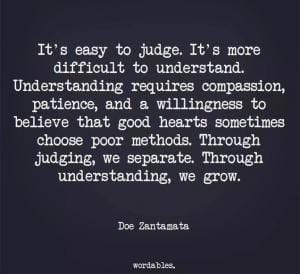 * I then validate what I can of the specifics of what they said, “Ah. Well, I can see how you’d come to think as you do given those experiences. Yeah, I get it.. ..Pause..
* I then validate what I can of the specifics of what they said, “Ah. Well, I can see how you’d come to think as you do given those experiences. Yeah, I get it.. ..Pause..
* And then I ask, “..Would you be curious to hear about the experiences that I’ve had in life that lead me to think the way that I currently do?”
They generally say yes. And, notice how I said, “the way I currently do?”… this plants the seeds that I’m open-minded and that I hold my views loosely and am willing to change them… which plants the seeds for them to consider holding “their current” views loosely and perhaps being willing to change.
I make a point to avoid going into much detail with “facts” that I’ve come across, it’s more about sharing my story and experiences.
* And then, instead of going from there into debate, I say “Okay, cool. Well, we can discuss this stuff more some other time. So, what are some of your favorite things to do in life?…” This is building trust and rapport – it’s developing friendship. It’s in the realm of friendship and good neighborliness that transformation happens. And it’s not just a one way street – if we engage in authentic relating, we’ll be transformed in the process too.
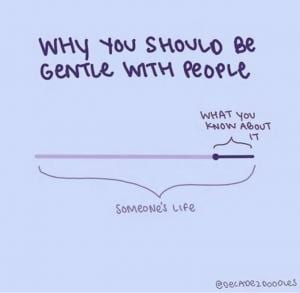 * I then make a point to seek to have further conversations with them to engage further, or, if it looks like there may not ever be another chance to converse again, and if it feels like we have time, after connecting a bit sharing about our lives, showing each other photos of our kids and pets, etc, I test the waters to see if they’d like to continue exploring the topic at hand.
* I then make a point to seek to have further conversations with them to engage further, or, if it looks like there may not ever be another chance to converse again, and if it feels like we have time, after connecting a bit sharing about our lives, showing each other photos of our kids and pets, etc, I test the waters to see if they’d like to continue exploring the topic at hand.
Here’s some inspiring insights about these matters:
We are not enemies, but friends. We must not be enemies. Though passion may have strained, it must not break our bonds of affection. The mystic chords of memory will swell when again touched, as surely they will be, by the better angels of our nature. ~
In a speech Abraham Lincoln delivered at the height of the Civil War, he referred to the Southerners as fellow human beings who were in error. An elderly lady chastised him for not calling them irreconcilable enemies who must be destroyed. “Why, madam,” Lincoln replied, “do I not destroy my enemies when I make them my friends? ~
Love is the only force capable of transforming an enemy into friend and We must live together as [siblings] or perish together as fools. ~ Rev. Dr. Martin Luther King, Jr.
Across the gulfs and barriers that now divide us, we must remember that there are no permanent enemies. Hostility today is a fact, but it is not a ruling law. The supreme reality of our time is our indivisibility as children of God and our common vulnerability on this planet. – John F Kennedy
It is a fearful thing to hate whom God hath loved. To look upon another…his weaknesses, his sins, his faults, his defects… is to look upon one who is suffering. He is suffering from negative passions, from the same sinful human corruption from which you yourself suffer. ..This is very important: do not look upon him with judgmental eyes of comparison, noting the sins you assume you’d never commit. Rather, see him as a fellow sufferer, a fellow human being who is in need of the very healing of which you are in need. Help him, love him, pray for him, do unto him as you would have him do unto you. ~ St. Tikhon of Zadonsk
Though we may not think alike, may we not love alike? If your heart is as my heart, give me your hand! ~ John Wesley
And of course, the Prayer of St. Francis:
Lord, make me an instrument of your peace:
where there is hatred, let me sow love;
where there is injury, pardon;
where there is doubt, faith;
where there is despair, hope;
where there is darkness, light;
where there is sadness, joy.O divine Master, grant that I may not so much seek
to be consoled as to console,
to be understood as to understand,
to be loved as to love.
For it is in giving that we receive,
it is in pardoning that we are pardoned,
and it is in dying that we are born to eternal life. Amen.
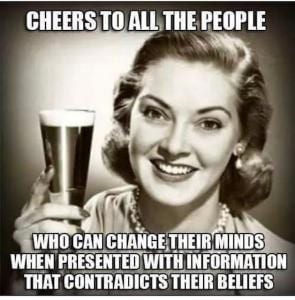 Perhaps some of this has landed well with you. Perhaps you too are feeling inspired to more frequently try engaging with people who currently think differently than we do. May all that is holy, all that is commendable, all that is civil and beneficial be with us as we do what we can to get all hands on deck for a world that needs it.
Perhaps some of this has landed well with you. Perhaps you too are feeling inspired to more frequently try engaging with people who currently think differently than we do. May all that is holy, all that is commendable, all that is civil and beneficial be with us as we do what we can to get all hands on deck for a world that needs it.
XX – Roger
P.S., I’ve utilized some of the techniques that experts recommend in this very blog. I’ve written less bluntly than I sometimes do. I’ve qualified things and spoke in less direct ways. I tried to avoid coming across as overly declarative and created space for wondering aloud together. Indeed, this piece is an intentionally gentler version of a blog that I wrote back in September – a piece that resulted in Facebook disabling my account (apparently, permanently). In that piece, I intentionally adopted a bit of a gruff, macho tact – as I was intentionally writing specifically to fellow straight, white, cis-gender, liberal, Christian men and thought I’d drop the kid gloves and offer a righteous 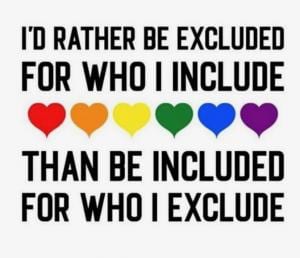 rant. While several men did inform me that they felt moved by that piece and came ’round to sharing my resolve in seeking to attempt new ways of interacting with conservative men, it seems that Facebook’s algorithmic robotic scanners may’ve noticed the strong and colorful words I was wielding (but in “quotations”) in that piece and assumed I was engaging in hate speech. I stand by that piece and am not sure I’d word it differently (though I could be persuaded if Facebook would inform me exactly what I wrote that was a “violation of terms”), and I don’t intend to always pull my literary punches going forward, but I does seem wise for me to take to heart what experts in the fields of rhetoric, debate, and persuasion have to say. Indeed, after writing this piece, it’d be hypocritical if I didn’t.
rant. While several men did inform me that they felt moved by that piece and came ’round to sharing my resolve in seeking to attempt new ways of interacting with conservative men, it seems that Facebook’s algorithmic robotic scanners may’ve noticed the strong and colorful words I was wielding (but in “quotations”) in that piece and assumed I was engaging in hate speech. I stand by that piece and am not sure I’d word it differently (though I could be persuaded if Facebook would inform me exactly what I wrote that was a “violation of terms”), and I don’t intend to always pull my literary punches going forward, but I does seem wise for me to take to heart what experts in the fields of rhetoric, debate, and persuasion have to say. Indeed, after writing this piece, it’d be hypocritical if I didn’t.
Related Blogs: “Enough with The Progressive Christian Outrage Machine!”
“The I Love Donald Trump Spirituality Test” “Not a Maze, a Labyrinth” “The Holy Huh”
 Rev. Roger Wolsey is a certified Spiritual Director, United Methodist pastor, and author of Kissing Fish: christianity for people who don’t like christianity
Rev. Roger Wolsey is a certified Spiritual Director, United Methodist pastor, and author of Kissing Fish: christianity for people who don’t like christianity
Click here for the Kissing Fish Facebook page
Roger’s other blogs on Patheos
** If you would like to become a patron of Roger’s work as a spiritual writer, please click Here to learn more.













